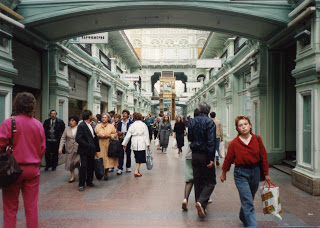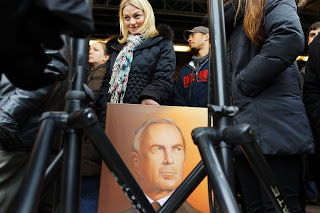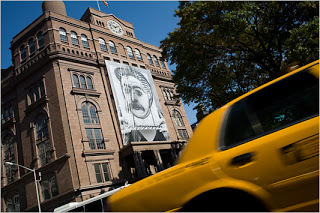The Red Flag and the Red Blazer
By Daniel Greenfield
SultanKnsih.Blogspot.com
Somewhere in the first half of the movie "Moscow
on the Hudson", a bedraggled Robin Williams huddles
on the luxurious first floor of Bloomingdale's
clamoring in an unconvincing Russian accent that he
wants to defect. Standing between him and a furious
KGB officer is a minimum wage store security guard
in a red blazer.
The KGB officer hisses that he protests the
defection in the name of the Soviet Union. The
security guard retorts that his own jurisdiction
runs "from Style Boutique, through Denim Den, all
the way up to Personal Fragrances." And the Soviet
Union and the KGB have no jurisdiction in Denim Den.
While the KGB officer casts a terrifying
supernatural pall over his own people, to a
Bloomingdale's security guard armed with mace and
handcuffs, he is no more than another annoying
customers in a store filled with them. The red
blazer trumped the red flag.
Sixty years after Stalin's death, the red flag is
very much with us. The red blazer however has seen
better days.
The KGB agent of the waning days of the Soviet Union
might have been a comic figure, roaming the
glittering aisles of capitalism, caught between
sneering at the decadence of capitalism and stuffing
as much of it in his pockets as possible. But the
KGB agents have had the last laugh.
After Stalin's death, the KGB and the Soviet
leadership had a quiet tussle that ended with the
KGB being sent to its corner, under the guns of the
army, and a series of uninspiring leaders overseeing
the decline and fall of the Soviet Union.
Unlike the Communist Party, which in Russia largely
consists of bitter old men and women kissing
portraits of Stalin and complaining how the young
people have no manners anymore, the KGB has
rebounded by merging with Bloomingdale's.
Putin's KGB hierarchy saw no reason why the Russian
people couldn't have aisles of overpriced products.
Indeed the Putin era looks a lot like the 80s on
steroids, big on big, full of artificial everything,
million dollar opportunities, vulgarity for the sake
of vulgarity, and theft for the sake of theft.
Finally the ordinary Russian could have his own
oversized TV, piles of debt to pay for it and the
opportunity to sit watching bad Russian remakes of
American 80s sitcoms.
No one in Russia would ever again have to spend
oodles of time trying to understand what Marx was on
about or the finer points of the arguments between
the various branches of the left that invariably
ended with the winners shooting the losers in the
head after a series of show trials.
What Putin offered the Russian people was Communism
without the Communism. A strong central government,
a ruthless secret police and a cult of personality
without any of the politics. There are plenty of
parties in Russia, but none of them actually matter.
The best of them are calculated distractions, large
noisy things meant to keep the attention of the
people away from those who do hold the actual power.
About the best of these is Vladimir Zhirinovsky,
familiar to readers of the New York Times from the
time that he posed naked in the shower on the cover
of its Sunday magazine. Zhirinovsky, like Savely
Kramorov, the talented comic actor who played the
KGB agent in "Moscow on the Hudson", is a comic
genius. The difference is that Kramorov played
outrageous characters in the movies, Zhirinovsky
plays one in real life.
Every so often, Zhirinovsky will say something
calculatedly awful about shooting everyone who isn't
in his party, dumping nuclear waste on Ukraine or
using nuclear bombs on the Atlantic Ocean to flood
the United Kingdom. Media outlets will sometimes
report on Zhirinovsky's antics, little realizing
that they are dealing with a man whose job is
playing Archie Bunker in real life. During the days
of the USSR, many Soviet leaders were actual idiots
no better or saner than the buffoon that Zhirinovsky
pretends to be. In the savvy KGB-run Russia, the
people are allowed to have a man playing an idiot as
a prominent politician with no actual authority.

The KGB, which has gone through another one of
its many name changes, no longer shrinks in the
glittering golden aisles of a department store. It
owns the department store and everyone in it. It has
caught up to the America of the 80s and become a
distorted version of it. And if that boom is built
on the illegal seizure and monopolization of energy
wealth, a wealth that is fading away, then the boys
and girls of the sword and shield have a Plan B up
their sleeve.
Meanwhile in Bloomingdale City, the opposite has
been taking place. In "Moscow on the Hudson", the
quintessential 80s cast of New York City movie
types, a loudly gay fitting assistant, a
jive-talking black man, a group of Japanese tourists
photographing everything, included a beefy cop with
a Brooklyn accent arriving to announce, apropos of
nothing, that, "This is New York City, a man can do
whatever he wants."
That line could have still been delivered with a
straight face in 1984. It would be met with
uproarious laughter today. In the New York City of
today, a man can do whatever he wants, except order
a soda, have some salt, drive his car through
midtown, smoke, drink and about forty thousand other
things. A Soviet citizen arriving in the New York
City of 2013 might be initially confused, but would
quickly adapt once they learned the new politically
views that they were expected to hold and the phone
numbers that they could call to inform on their
neighbors.
If Moscow has become more like New York City, New
York City has also become more like Moscow. In ten
years, it may be easier to buy a McDonalds burger in
Moscow than in New York. There were hints of this
trend even then, as Robin Williams' character
arrives at a posh party only to be stuck talking to
a woman who teaches Marxism-Leninism. While the
circus performers of the Communist paradise wanted
nothing more than 30 minutes in New York, many New
Yorkers wanted nothing more than to turn New York
City into Moscow on the Hudson.
At the climax of "Moscow on the Hudson", a
debate over the choice between order and freedom
in a Brooklyn diner on the Fourth of July ends with
quotes from the Declaration of Independence recited
by a diverse cast of immigrants and a man walking
off into the night carrying a sparkler in his hand.
The sparkler however has been banned in the entire
state since 1997. Governor Andrew Cuomo recently
vetoed a bill that would have legalized sparklers at
the urging of Mayor Bloomberg.
“The governor believes that safety comes first,” his
spokesman said. So much for life, liberty and the
pursuit of happiness.
The multicultural island where everyone embraces the
ethos of freedom is a cinematic pipe dream. It was a
fading memory even in the 80s. In the 90s, Giuliani
made New York safe again. In the 00s, Bloomberg made
it bankrupt and boring.
Bloomingdale's filed for bankruptcy around the fall
of the Soviet Union. Five years after the movie
aired, it was already making plans
to open stores in Moscow. In 1989, Pravda
reported that Soviet goods would be sold in its
flagship Manhattan store and a Bloomingdale's would
open in Moscow. That never did happen, either under
Communism or after it, and the American big retail
store model has only been getting shakier ever
since.
In the Soviet Union, central government concentrated
wealth in Moscow making it a mecca for the rich and
powerful. Now central government has been having
that same effect on Washington D.C. While New York's
star has been fading, along with its illegal
sparklers, Washington has become the new Moscow.
Washington is the only city where the average
household income stretches far enough to afford a
new car. It is the only city where incomes have been
growing as if there were no recession. It and its
surrounding bedroom communities have become glutted
on the wealth of a nation as America's instructors
of Marxism-Leninism have discovered that you can
have both the red blazer and the red flag.
Like Russians in the 1910s, Americans in the 2010s,
are becoming more comfortable with the rhetoric of
redistribution and a strong central government that
will provide them with stale bread in exchange for
their freedom. "What good is freedom?" is the
question being asked in every sphere of life and the
answer is rarely positive.
If giving up freedom can get you cheaper health
insurance, fewer school shootings and less worries
about the future, then who needs it anyway?
During the Cold War, many Russians and Chinese saw
an America where you could live like a king and
Americans saw a Soviet Union where the government
took care of you. The old Communist countries have
remade themselves into totalitarian capitalist
entities where you can make a lot of money and never
have to read the writings of Lenin or Mao, so long
as you don't challenge those in charge. America is
remaking itself into a totalitarian Socialist entity
where the government will take care of you, badly,
and where you are expected to read the politically
correct indoctrination of the day and where you had
better not challenge those in charge.
Russia and China have not become that much more
free, but America has become far less free. Many of
its immigrants have not embraced an ethos that
traded order for freedom, but instead they want what
the Russians wanted, the glitzy wealth of
Bloomingdale's with the security of a Socialist
state. Those two things do not go together. Instead
what they have gotten is an oligarchy running up
huge bills on their credit to pay for everything
under leaders who sound less like America and more
like Moscow.



